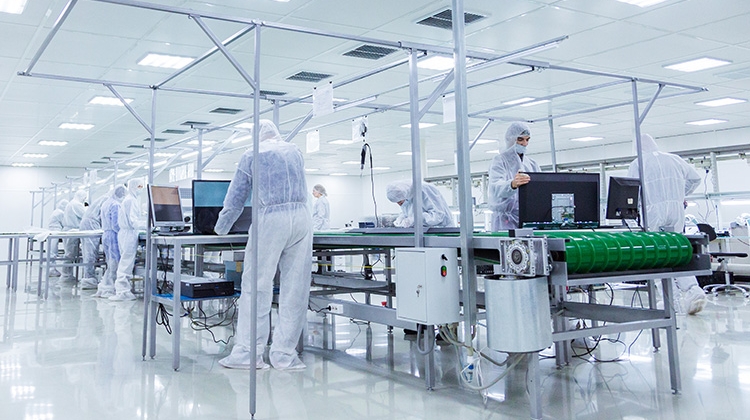New opportunities offered by recent and emerging technologies are completely changing the game and making new scenarios possible, even the ones considered impossible a few years ago. During this conference, you will deep dive into innovative, but industry proven, ways of extracting benefits from digital solutions that combine one or more enabling technologies, like GxP cloud, collaboration platforms, big data and advanced analytics, Industrial Internet of Things (IIoT), Artificial Intelligence/Machine Learning (AI/ML), image recognition and advanced robotics.
Each case study will discuss a problem, a solution, the adopted technologies, benefits whenever possible quantitative, challenges, and lessons learned.
Analysis of 30+ Pharma 4.0 Use Cases
Edoardo Schiraldi, Corporate Program Manager at Menarini and co-author of the ISPE Baseline® Guide: Volume 8 – Pharma 4.0™, kick off the session with a high-level summary of the 35 selected and structured case studies that were collected during the preparation of the Pharma 4.0 Baseline Guide. He will present a high-level analysis with triggers, solutions, innovative technologies, involved organisational teams, benefits, challenges, and lessons learned.
It's worth noting that most of the 35 case studies achieved their results, not using one single novel technology, but a combination of several of them. They extensively adopted: GxP cloud, big data, collaborative platform, and AI/ML (being the last tech used in 13 of them). A few lessons learned highlighted that:
- It is essential to embrace early education and involvement of the whole project team
- We need to enable trust and user acceptance of innovative technologies
- Cybersecurity needs to be evaluated from very early on
- Organizations lack adequate culture – technical, business, organizational – to ingest, analyse, and properly use vast amounts of data
Improving Aseptic Interventions with AI-supported Monitoring
Now, let's delve into some specific case studies to better understand these concepts. The specific case studies session will start with Daniela Pinter, Master Student at the University of Graz, and Christoph Köth, Director of Innovation atFresenius Kabi, both of whom are from Austria. Their presentation, “Improving Aseptic Interventions with AI-supported Monitoring - Review of a Pilot in a GMP Production” will discuss how to deal with the AI hype and how to lead it to success. After very promising initial experiences with AI-supported intervention detection and classification, the system has arrived in the GMP environment with very high expectations. Although the filling isolator is not yet fully operational for its intended use in aseptic manufacturing, its influence on the production of terminal sterilized products is already recognizable. The question is where do expectations, doubts, and reality meet?
Flexible Line and Lean Logistics for Packaging
We will then move to a case study of digital transformation in logistics with a talk from Janssen: “Flexible Line and Lean Logistics for Packaging” with Alessandro Zanotti, Manufacturing and Pack-aging Project Delivery Manager, and Alessandro Sciacca, Project Delivery Senior Manager. They initiated the case from the need to improve the management of small-sized batches in the packaging department in a highly integrated and automated production site. Using a mix of innovative technologies (advanced robotics and image recognition) they experienced benefits such as fast changeover, easy set-up, agile production scheduling, compact work cells, human and machine working hours reduction, OEE increase, improved quality and compliance, and cost reduction. Quantitative KPIs will be reported.
Visual Inspection in Sterile Manufacturing
The next presentation will be a sterile production case study: “Visual Inspection in Sterile Manufacturing (ML)” by Gitte Bjørg Windfeldt, Head of Data Science, Digital Transformation and Technology PSQIT TEC, Novo Nordisk. Last year, Novo Nordisk introduced deep learning (DL) into the pharmaceutical arena by implementing DL detection algorithms for automated visual inspection. In this talk, Gitte will present the learnings from using this technology in pharmaceutical manufacturing.
Lean, Compliant & Digital Quality Control Lab
The lab area will conclude the track session with a speech by Sara Del Carlo, Quality Control Senior Manager and Qualified Person, Kedrion Biopharma, entitled“ Lean, Compliant and Digital Quality Control Lab.” She will share their journey to achieve better compliance and lean processes while simultaneously digitalizing their Quality Control department. At the beginning of the transformation journey, the company had a fragmented mix of information sources (different applications, XLS/access, paper), causing issues when adequate and timely KPIs were needed for root cause analysis, audits, and inspections. After several years, they report proven benefits that include full traceability in ALCOA+ compliance, cross-functional review and investigation support, qualified person support for compliant batch release, contributions to their product quality report, reduction of physical archives, real-time KPIs availability, agile work scheduling, harmonized operators user interfaces, and increased resource efficiency in data management.
Panel Discussion with all Speakers from Track 4
To wrap up this track, there will be a dynamic panel discussion. This will be a unique opportunity to hear more from our session presenters, as they delve deeper into their specialist subjects and address broader questions about their use cases. Prepare yourself for a lively and enlightening conversation.
We invite you to participate and engage in informative and thought-provoking discussions, which could help you identify opportunities for significant incremental improvements within your own business.
As you can see, it's an opportunity not to be missed to listen to the direct voices on the great benefits that digital transformation can provide to the pharmaceutical industry, together with key project information, including challenges that have been experienced.
Learn more & Register








